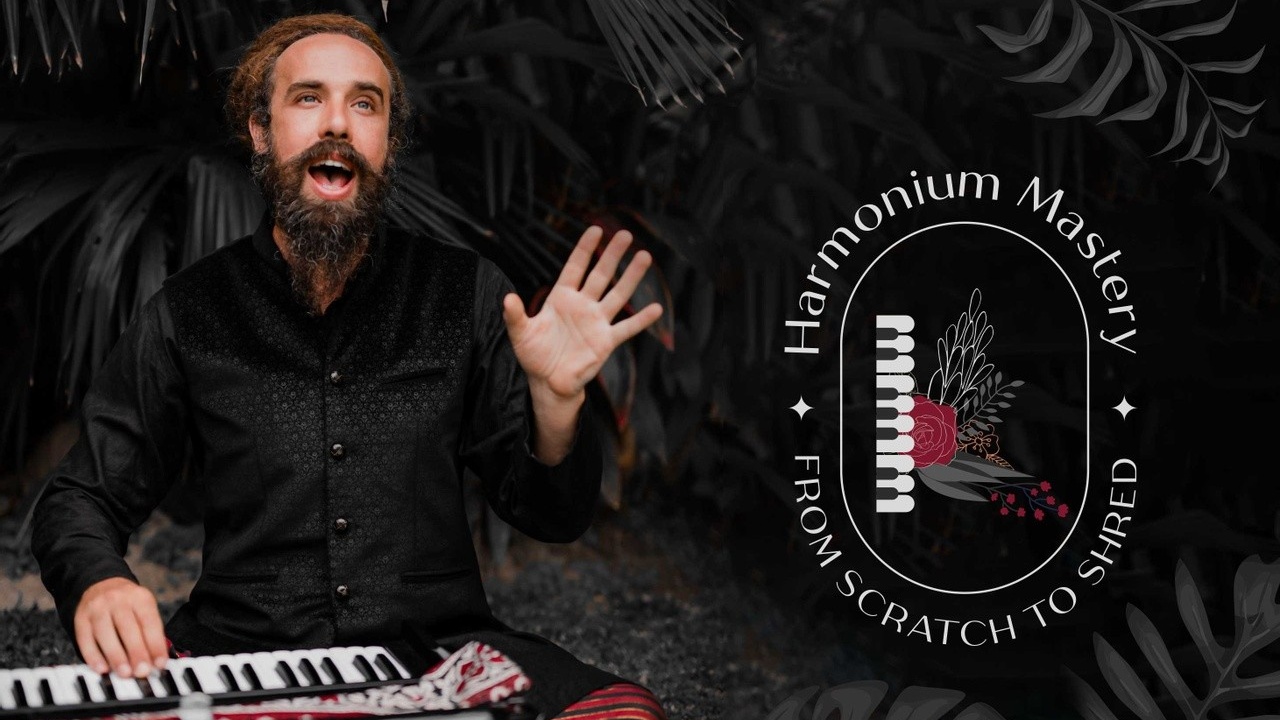Harmonium Mastery: From Scratch to Shred
Take your harmonium game from novice to absolute shredder with Tahir Qawwal
What you'll receive & learn:
6+ Hours of exclusive HD video tutorials
-
Learn all the Essentials
Start from the very beginning with correct fingering technique; running scales and transposing thaats
-
Drill for Dexterity: Rhythm & Chords
Learn Tahir’s best practices to strengthen your fingers for virtuosity, as passed down to him by the masters
-
Fine-tune your Musical Ear
Practice accompanying vocals in any style of music. Improvise within a raag and learn ornamentation techniques to add texturing and flavour
-
Geek out on Anatomy
From bellows to reeds: Get up close and personal with your very own harmonium, and make it truly yours
- Beginner, Intermediate and Advanced Melodic Exercises
- Fingering Exercises
- Melodic Dictation
- Weeks worth of melodic patterns
- Thaat knowledge
- Masterful Improvisation & Accompaniment
- Bump your order on bespoke harmoniums (contact us)
About Tahir Qawwal
Tahir has been teaching traditional vocal music all over the world for the past 20 years. He is a passionate and highly skilled vocalist and harmonium player, having spent plenty of study time with Pakistan’s present day Qawwali masters. Tahir’s guruji Pt. Pashupatinath Mishra of Varanasi has passed on to him a great musical knowledge. Tahir’s unique expression of the classical art of Indian music is shown by his ability to perform and teach styles such as Geet, Ghazal, Bhajan, Thumri, Classical & Folk songs.
Qawwali is a passionate devotional practice in which the fire of divine love (ishq) is ecstatically expressed through the mystical verses of Sufi poets, sung in Urdu, Farsi, Hindi and Punjabi. The origins of Qawwali music date back about a thousand years to the first Sufi mystics who came to India. Qawwali has evolved into an immense art form spanning over hundreds of years of poets, languages & musical evolutions.
Originally from a small town in Nova-Scotia Canada, Tahir Hussain Faridi Qawwal has been journeying into music and mysticism within the Indian subcontinent from a very young age. At fifteen he was taken in by the great tabla maestro Harjeet Seyan Singh, and under his noble tutelage initiated into the profound subject of Indian rhythm cycles. Several years of rigorous tabla instruction later, Tahir became completely enchanted by his teachers singing voice. Tahir’s late teens were mostly spent wandering in the Gharwal Himalayas living as a lonely dervish, practicing the yogic path and searching for sur with a shruti box in hand. ’Sur’ is at the heart of all Indian/Pakistani classical music and when translated to English means ‘purity of sound and pitch’. Because of the wide tonal spectrum of classical Indian raaga notation, the profound journey into sur requires the grace of a guru. Tahir Qawwal’s first knowledge of sur came by the kindness of Pandit Sanjeev Jha of Varanasi.
“Dissolving oneself within any perfect sur under the shade of a tuned tampura is total bliss.”
Throughout his early tutelage of raaga, Tahir also immersed himself in the sacred sufi writings of Data Ganj-e-Buksh, Hazrat Amir Khusrau, Baba Bulleh Shah, Baba Ganj-e-Shakar, Shah Hussain, Khaja Ghulam Farid and others. Because of these spiritual inspirations and his shahadat (initiation) into Tasawwuf (Sufism) by Sheikh Liben, Tahir’s path in music was quickly directed towards qawwali.Qawwali is the perfect marriage of classical raag & divine sufi passion. Tahir’s first formal training in the qawwali genre began in Ajmer Sharif where he and his musical companion Aminah Chishty enjoyed an extended stay at this important Indian sufi shrine. Under the wise hospitality of Ajmer’s great qawwal’s and sufi’s, dozens of the qawwali songs Tahir had transcribed up to this point were finally translated with a deeper clarity.
“Beyond the literal translation of qawwali poetry, there is a profound world of spiritual & cultural metaphor which can take years to understand.”


